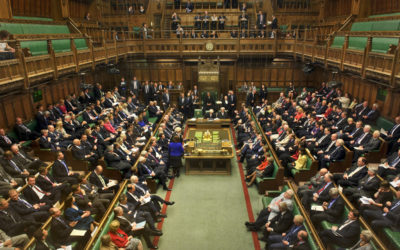Military recruitment of under-18s debated in Westminster
ForcesWatch comment
We report on the recent debate in Parliament arguing that the age of recruitment to the UK armed forces be raised.
Another important debate was taking place in Parliament as MPs were scrutinising the Government’s Brexit Bill earlier this month.
In the Grand Committee Room of Westminster Hall members of various parties had their say (7 Feb 2017) on The Recruitment of under-18s into the Armed Forces.
Liz Saville Roberts MP, of Plaid Cymru, brought the debate before Parliament with the full backing of her party which supports raising the recruitment age to 18 in line with international standards.
ForcesWatch was present along with representatives from Veterans for Peace and Quaker Peace and Social Witness.
The hour-long hearing demonstrated that the age of military recruitment is very much alive as an issue at Westminster, even amid the sound and fury of Brexit.
Moving the motion Saville Roberts said she was “concerned about the welfare of young people who join the armed forces and the army in particular.”
The purpose of the debate, she added, was “to seek answers from the MoD regarding numerous concerns about the recruitment of young people under the age of 18 to the armed forces and to press for a thorough and independent review.
“Dozens of religious, military, legal and policy organisations, alongside unions and trusted military professionals, have expressed concerns about this policy.
“They include the Select Committee on Defence, the Joint Committee on Human Rights, the United Nations Committee on the Rights of the Child, the Children’s Commissioners for all four nations of the UK”, she said.
Saville Roberts also highlighted the significance of the recent report by the medical charity – Medact – which revealed young recruits to be more vulnerable to post-traumatic stress disorder (PTSD), alcohol abuse, self-harm and suicide.
In an intervention the SNP backbencher, Tommy Sheppard, pointed out that “three quarters of 16-year-old recruits have a reading age of 11 or less”; his party colleague George Kerevan asked about the UK being “the only NATO member that recruits at the age of 16.”
There were also contributions from Conservative backbencher Anne-Marie Trevelyan and Jim Shannon of the DUP, both of whom opposed the motion. The Liberal Democrats were represented by former Scotland Secretary, Alistair Carmichael, through he did not speak.
There were tensions in the SNP when Steven Paterson spoke for almost all of the time remaining for backbenchers.
In so doing he seemed to deny party colleague Ronnie Cowan – a strong supporter of policy change – a reasonable chance to speak. Cowan was told by the Tory chair Mark Pritchard that he would have only 30 seconds to address Members.
This prompted Sheppard to cry “that is farcical” before Cowan got to his feet for just ten seconds. Kirsten Oswald, who leads for the SNP on armed forces and veterans, then declined to take an intervention from Cowan.
Oswald said that the party supports 16 and 17-year-olds joining the military “if that is an informed, positive and open choice.
“However, it must be based on transparency. There must be a culture of improvement, training and aspiration and an openness to ongoing discussion about how we do the best we can for all our young people”, she added.
For Labour, the shadow Armed Forces Minister, Wayne David raised a number of points which seemed to back up the concerns outlined by Saville Roberts and others.
He said “enlisting at 16 leads to a higher risk of unemployment because of the large drop-out rate among 16 and 17-year-olds” and suggested this was a “very expensive way to recruit to the armed forces given the relatively high drop-out rate.”
He went on to express concerns about “the relatively weak safeguards around parental consent” and called for face-to-face meetings between parents and the military before consent is obtained.
David also said that Britain’s opposition to the use of child soldiers is weakened “because we rely so heavily on 16 and 17-year-olds ourselves.”
He went on: “although I do not consider them to be children, they are nevertheless not fully fledged, mature adults. That is something we ought to be careful of.”
David also reminded those present of the 2005 report by the Defence Committee which made a number of recommendations to the MoD and asked that the Government fulfil that commitment.
Most of the subsequent response from Armed Forces Minister, Mike Penning, was anecdotal background about his own career in the Army.
He said he supported recruitment under-18 because “the earlier we can train people with apprenticeships and the skills we need throughout our armed forces, the better, without a shadow of doubt. We can utilise that time for that person to feel fulfilled, aspirational and to get the skills.”
Saville Roberts, in summing up, said she was “disappointed by the Minister’s response” and had “expected more of an answer to the specific questions.”
She then read the text of an EDM (Early Day Motion) from 2005 urging the then Labour Government ‘to raise the age at which young recruits can be enlisted into the armed forces to 18 years and thereby set an example of good practice internationally’.
Directing her remarks towards Penning, Saville Roberts said: “the Minister signed that early-day motion in 2005. When did he change his mind?”
The debate can be viewed here (from 16:29).
See more: legislation & policy, recruitment age, UK Parliament
Like what you read?
> Sign up for our newsletter or blog notifications
> Support our work – from just £2 a month










